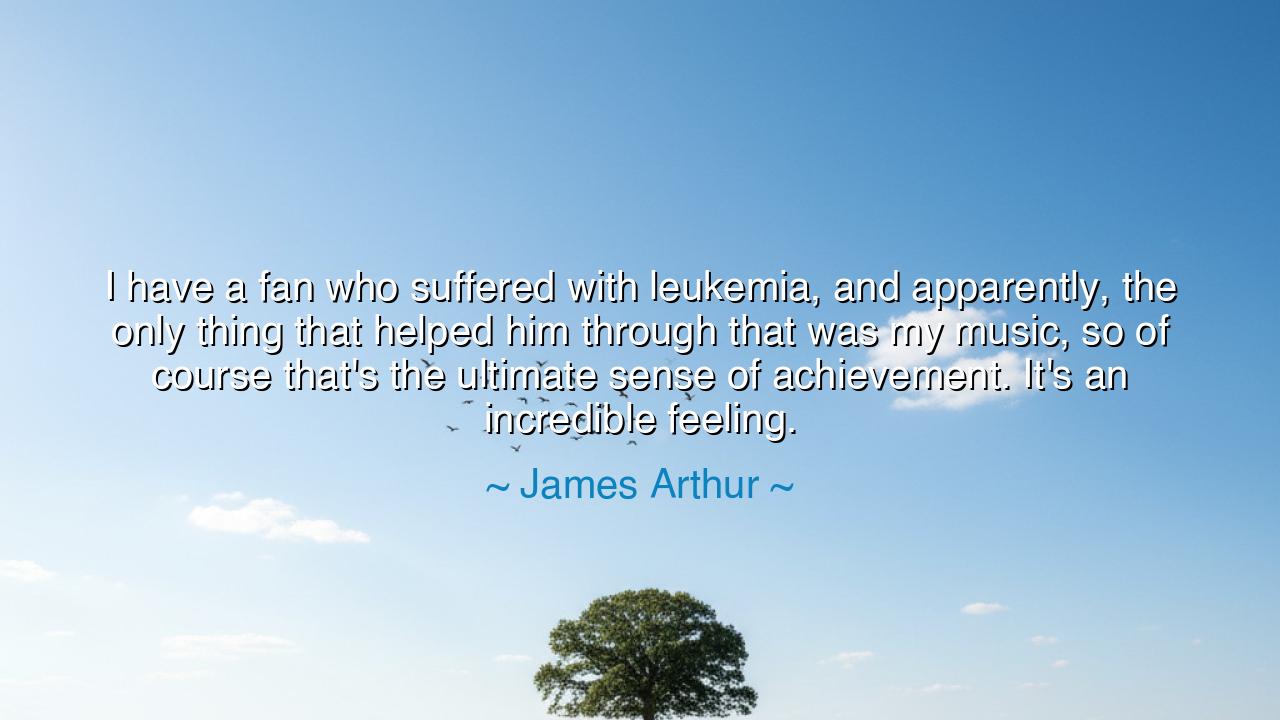
I have a fan who suffered with leukemia, and apparently, the
I have a fan who suffered with leukemia, and apparently, the only thing that helped him through that was my music, so of course that's the ultimate sense of achievement. It's an incredible feeling.






Hear now the voice of James Arthur, who speaks not only as a singer but as one who has touched the secret chambers of the human soul: “I have a fan who suffered with leukemia, and apparently, the only thing that helped him through that was my music, so of course that’s the ultimate sense of achievement. It’s an incredible feeling.” These words are not mere recollection, but testimony to the divine power of art. For what greater triumph can there be than to give strength to the weary, light to the afflicted, and hope to one who walks in the shadow of death?
In this confession lies the true meaning of music—not as performance alone, not as applause or fame, but as medicine for the soul. Where the body falters, where doctors labor and science bends its might, the spirit yet cries out for comfort. And here enters the song, carrying what cannot be prescribed: courage, solace, and a whisper of eternity. James Arthur does not boast of wealth or renown, but of this sacred moment, when his gift lifted a heart through the dark valley. In such a story, we see that the highest achievement of any art is not its beauty, but its power to heal.
Think, O listener, on the tale of Beethoven, who, though deaf, composed symphonies that carried generations beyond despair. In the depths of his own suffering, he forged the Ode to Joy, a song that has endured revolutions and wars, giving to humanity a voice of triumph. So too, in Arthur’s story, we find the same eternal principle: that the artist who suffers or strives does not live for himself alone, but for the unseen soul who listens, who clings to that music as to a lifeline. For the one with leukemia, the song became a lantern in the night, proving that sound itself can be as mighty as medicine.
Yet let us not imagine this power belongs only to the famous. Each of us holds within our voice, our words, our actions, a kind of music. Perhaps it is not sung on great stages, yet when spoken with compassion, when offered with sincerity, it can heal as surely as any melody. A kind word to a grieving friend, a story shared with one in despair, a gesture of love to the forgotten—these too are songs, and they too may help someone through their darkest hour.
Thus, the wisdom of Arthur’s words reaches beyond celebrity. They remind us that life’s truest glory is not in trophies, nor in crowns, but in the quiet testimony of another who says, “Because of you, I endured.” To be remembered for such a gift is to have written one’s name in the book of eternity. For kingdoms fall and fame fades, but the memory of hope kindled in another heart is indestructible.
The lesson, then, is clear: do not underestimate the power of your gifts, however small. If you are an artist, pour your soul into your craft, for you know not who listens in silence, fighting unseen battles. If you are a worker, a teacher, a parent, a friend—let your life be your music, lifting others when they cannot lift themselves. The measure of your greatness will not be the number who know your name, but the depth of the lives you touch.
So take up this teaching, O children of tomorrow. Let your achievement not be counted in gold, but in hearts healed. Let your fun not be measured in fleeting pleasures, but in the eternal joy of knowing that your life was a song that carried others across their suffering. And when you reach the end of your days, may you too say, as James Arthur said: “It is an incredible feeling.” For there is no higher crown than this.






AAdministratorAdministrator
Welcome, honored guests. Please leave a comment, we will respond soon